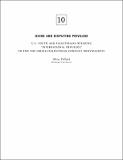| dc.description.abstract | On March 16, 2003, Rachel Corrie, a 23-year-old American college student from Olympia, Washington,
was crushed to death by an Israeli military bulldozer while attempting to prevent, with her own body, the
Israeli demolition of a Palestinian doctor’s home in the Occupied Territories. Photos of blond and petite
Corrie, taken during the incident by fellow twenty-something nonviolent activists in the “International
Solidarity Movement” (ISM), which Corrie had joined for her work in Palestine, showed her standing
high on a pile of dirt in front of the American-made Caterpillar bulldozer. A small figure in a fluorescent
jacket holding a bullhorn, she sat down momentarily to stop the bulldozer and then stood high on the
dirt pile and looked the bulldozer’s driver in the eye. The bulldozer didn’t stop. It ran her over, pinning
her under the mound of dirt; it then reversed without lifting its blade and ran over her again. ISM volunteers
quickly surrounded the crushed and bleeding Corrie, who gasped, according to 21-year-old fellow
ISM activist Joe from Iowa, “They broke my back.” Shortly after Palestinian ambulance drivers transported
Corrie to a local hospital, she died from a crushed chest and skull, joining the hundreds of young
Palestinians and scores of young Israelis killed throughout the Israeli military and settler occupation that
she and other ISMers had come to challenge. | en_US |
